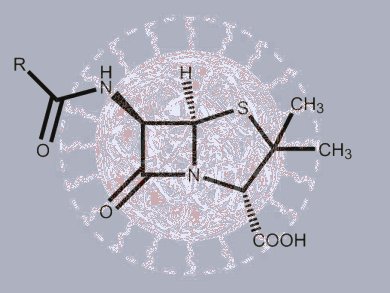Researchers at the University of Basel, Switzerland, have made nanoscopic capsules from an amphiphilic triblock copolymer using poly(2-methyloxazoline)-block-poly(dimethylsiloxane)-block-poly(2-methyloxazoline). By trapping the enzyme penicillin acylase within, the nanocapsules can be used as nanoreactors to generate, in situ, penicillin (pictured) which then inhibits bacterial growth on an agar plate. The nanocapsule protects the enzyme from its harsh surroundings as well as allowing for control over the dose of antibiotic.
The team suggests that by binding these nanoscopic antibiotic factories to materials used for surgical implants, it might be possible to preclude post-operative infection.
- Polymer nanoreactors shown to produce and release antibiotics locally,
Karolina Langowska, Cornelia G. Palivan, Wolfgang Meier,
Chem. Commun. 2012.
DOI: 10.1039/C2CC36345C




